What is CRM? A Complete Guide

11 Feb, 2019
Written by Ranjith Parasuraman, an IIT/IIM graduate with over 10 years experience in technology and customer focus
- What is CRM
- How does technology help companies treat customers as individuals?
- Prominent use cases of CRM
- CRM in B2B Sales
- CRM vendors for B2B Sales
- CRM in B2C marketing (Marketing automation)
- Use-cases of CRM in B2C marketing
- CRM vendors for B2C marketing
- CRM in B2C customer support/service
- Use-cases of CRM in B2C customer support
- CRM vendors for customer support
- Pitfalls in implementing CRM
What is CRM?
CRM stands for “Customer Relationship Management”. It is a buzzword. A lot of companies jump on the CRM bandwagon expecting magical increase in profit. But the magical increase in profit never comes. Instead, these companies struggle with a CRM implementation which drags on for years. Their employees don’t cooperate. Their customers never see any improvement in their experience. The problem is that most of the companies adopt CRM just because everyone else is doing it. They do not understand what exactly is CRM and what problem it solves. Without that understanding, they are bound to go wrong with its implementation. This article is an attempt to explain the basics of CRM and the problem it solves.
What is “Customer Relationship Management”?
Customer Relationship Management is the use of technology to improve your company’s relationship with customers.
Why worry about your company’s relationship with customers?
The quality of the relationship your company has with customers has a direct impact on the loyalty of customers. The loyalty of your customers has a direct impact on your profit. Having a good relationship with your customers results in more profits. Having loyal customers is the ultimate competitive advantage for your company. It is the cornerstone of a profitable and long-lasting company.
Why is it difficult to have a good relationship with your customers?
Most companies do not have a good relationship with customers. The reason is the lack of perceived empathy. If your customers feel that your company has no empathy for them, they will not have a good relationship with your company. Human relationships are based on empathy. Without empathy, it is impossible to have a good relationship.
Customers typically have a high tolerance for bad treatment from companies. This is because they understand that companies have a profit motive and are not obligated to be empathetic towards customers. But they expect to be treated like an individual. This is where most companies spoil the relationship with their customers. They don’t treat their customers as individuals. They herd them like sheep. When not treated as an individual, a customer will feel disrespected. For example, if a restaurant doesn’t differentiate between a regular customer and a new customer, the regular customers will feel disrespected.
Why is difficult for a company to treat customers as individuals?
It is easy for a mom and pop owner to treat his customers as individuals. He has real relationships with his customers. So treating customers as individuals comes naturally to him. But when he opens more stores it will quickly change. He has to hire employees to man his new stores. Employees have no obligation to build relationships with customers as it is just a job for them. So customers will feel that they are not being treated as individuals. They will feel disrespected. Even if some employees build relationships with customers, they will eventually quit the job. When these employees leave, they take the customer relationships with them. Therefore, there is no easy way for the mom and pop owner to scale his business without degrading relationships with customers. The reason is the variability of employees. Technology can help solve this variability.
How does technology help companies treat customers as individuals?
Two aspects of company-customer interaction signal individual treatment to customers. These two aspects are context and behaviour. A customer will feel like an individual when a company remembers the history of its relationship with the customer when interacting with the customer. This is the concept of context. For example, a regular customer of a restaurant will expect the restaurant to give him preferential treatment in the reservation of tables. A customer will also feel like an individual when a company behaves according to the customer’s individuality. For example, a regular customer of a restaurant will expect the restaurant to remember his favourites. The variability in employees affects both the context and behaviour of a company’s interaction with employees. Technology can help in both context and behaviour.
Technology helps in context by moving memory of customer interactions from employees’ mind to a computer database. When interacting with customers, employees can look up the database and immediately get a customer’s context. They no longer need to remember it on their own. The company doesn’t have to worry about employee variability anymore as technology compensates for it. Technology has no variability. It can indefinitely scale. So a company can maintain customer context at scale.
Technology helps in employee behaviour by moving judgement from employees to computer software. When interacting with customers, employees can seek guidance from software rather than using their own judgement. The management of the company, which has good judgement on behaviour, can create these rules and encode it in software. Employees can look up recommendations from the software and behave accordingly. For example, the owner of a restaurant can create a rule that certain customers need to be treated with special priority. The restaurant employees don’t need to remember this rule. They just need to look up the software before interacting with a customer. If the software says that a customer has to be treated with special priority, they will do so. With this software, the company no longer has to worry about employee variability in behaviour. Since the software can indefinitely scale with variability, the company can scale customer friendly behaviour.
The database and the software are collectively called the “CRM”. It is the technology which helps companies have a good relationship with customers. It solves the problem of companies degrading relationships with customers due to the variability of employees.
The future of CRM is complete automation. Using advances in artificial intelligence (AI) and machine learning employee variability can be completely removed. Employees can be completely removed from interacting with customers. Technology can interact with customers on behalf of the company. It will always remember the customer’s context and will know exactly how to behave. Such technology will allow companies to build good relationships at a huge scale. This scenario is the subject of the 2013 movie “Her” in which a computer program has personal relationships with millions of real people.
Prominent use cases of CRM
The biggest use cases of CRM are in B2B sales, B2C marketing and B2C customer support. Use of CRM in B2B sales has been common since the 1990s. Use of CRM in B2C marketing and customer support is new. It has been accelerated by the advent of the internet.
CRM in B2B Sales
Use of CRM in sales is the oldest and strongest application of CRM. If you are a salesperson you know that sales is all about numbers and relationships. If you build relationships with enough people, few will become leads and eventually few will become customers. But this process is not scalable. You cannot increase the number of relationships you have beyond a point. If you have too many relationships, the quality of your relationships will suffer. You can hire sales employees to help you. But employee variability will spoil relationships with leads. This is where CRM can help. It will help you build relationships with leads at scale.
Sales context
CRM software can store information about leads in a database. This database will have complete information on every lead and history of your company’s interactions with them. It will give your sales team context of every lead. It doesn’t matter if it is a new hire or an experienced team member, everyone in your team will have a perfect context whenever they interact with a lead.
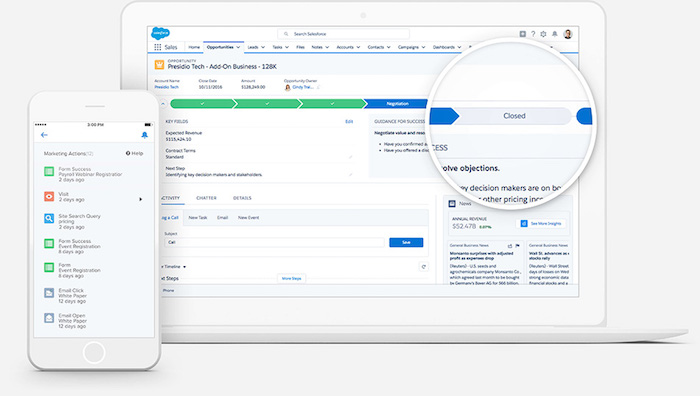 |
|---|
| Lead dashboard in Salesforce CRM |
Sales behaviour
You can codify the sales process of your company in CRM software. You can codify a journey which every lead goes through. For example, it will start with an initial call, then move to a meeting, then a proposal. The process will capture every possible outcome in every step. It will be a flowchart of the whole sales process. This flowchart will instruct your team in their sales tasks. But instead of keeping this process in their mind, they can look up the CRM software for instructions. For example, a lead might indicate that he is not buying at the moment and that he should be contacted in six months. The CRM software can categorise this lead as dormant according to your sales process and automatically prompt your team to call back the client in six months. CRM software will help you scale your sales by taking over the judgment of behaviour from your sales team. It doesn’t matter if it is a new hire or an experienced team member, everyone in your team will behave according to your process whenever they interact with a lead.
Sales automation
The ultimate use of CRM is sales. True scalability is attained when sales can be carried out without human intervention. Advances in the field of AI will make this happen. CRM is already automating small steps in the sales process. Every CRM software for sales will have email and message automation features.
Email automation -
You can do automated email outreach using CRM. You can set it up so that it is customised and automated for each lead. For example, each lead will receive a customised email based on their context. The process of following up can also be completely automated.
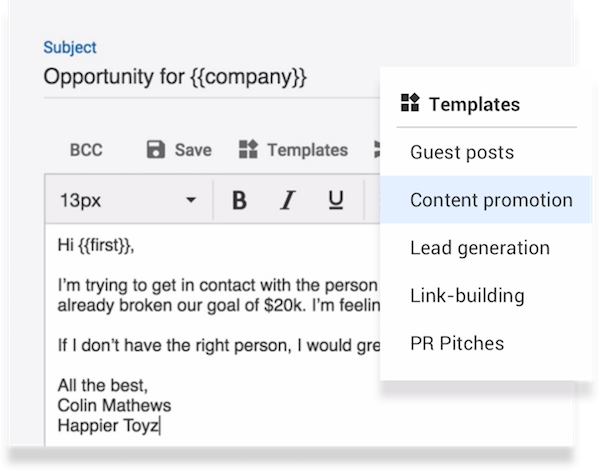 |
|---|
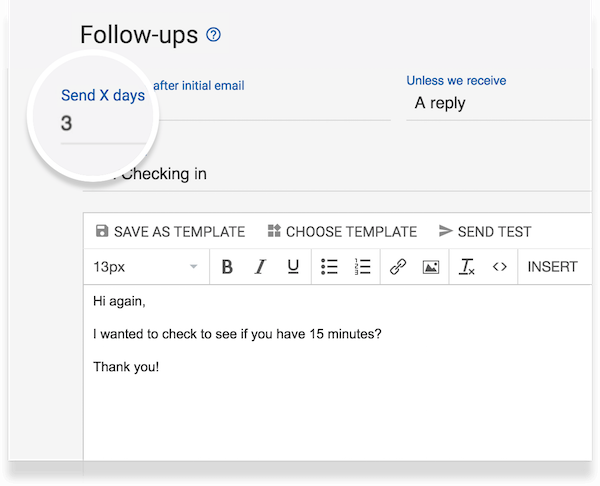 |
| Email automation is Mailshake CRM |
Message automation -
With advances in AI and machine learning, CRM can help your sales team communicate better with leads. The software will learn from interactions with leads and automatically recommend customised messages to your sales team. For example, if a lead says in an email that he should be called in 3 months, the CRM software can automatically suggest a reply “Great! Will check back in 3 months!”. It can also automatically prompt the sales team to contact the lead after 3 months.
CRM vendors for sales
Large companies
If you are a large company, it is best for you to use a CRM vendor who has experience in doing sales CRM implementations for large companies. These vendors will be able to customise their products according to your requirements. There are only four CRM vendors who cater to large companies- SAP, Oracle, Salesforce and Microsoft.
SAP
SAP has a product called “Sales Cloud” which is a CRM for sales. This product has features useful for large companies like salesforce performance management, revenue forecasting and compliant revenue recognition.
Oracle
Oracle has a product called “Sales Cloud” which is a CRM for sales. This product has features useful for large companies like salesforce coaching/motivation, price/quote management and adaptive intelligence for deals.
Salesforce
Salesforce has a product called “Sales Cloud” which is a CRM for sales. This product has features useful for large companies like opportunity/account management, workflow management and files sync.
Microsoft
Sales Force Automation is one of the products in Microsoft’s “Dynamics 365” enterprise software suite. This CRM product has features useful for large companies like Linkedin integration, AI-driven sales insights and lead engagement.
Startups and SMBs
If you are a start-up or a small/medium sized business then you won’t require too much customisation in CRM software. You can use a product off the shelf. Some of the popular products are given below. Some of these products are provided as a service. Such products do not require any installation on your company’s premises. They are delivered and used over the internet using a browser.
Zoho
Zoho is the leader in CRM software for SMBs. It is India based company started in 1996. It has accumulated thousands of loyal SMB clients over the last two decades. It has several enterprise software products all delivered over the cloud. The price is purely subscription based (Software as a service). Its CRM product is called “Zoho CRM”.
Delivery method - Cloud Major features - AI-powered sales assistant, multichannel lead management, sales workflow builder Price - $8 to $35 per user per month
Bitrix24
Bitrix24 is an enterprise software company whose main product is a collaboration platform. This platform has tools for sales team management including CRM, project management and social collaboration.
Delivery method - Cloud and on-premise Major features - Third party integrations, REST API, recurring deals management Price - $35 to $179 per month (cloud), $1,490 to $24,990 (on-premise)
Hubspot
Hubspot is a provider of digital marketing software for startups. Its sales CRM product is called “Sales Hub”.
Delivery method - Cloud Major features - Website live chat, cold email management, cloud meeting calendar Price - $50 to $1,200 per month
Freshworks
Freshworks is a fast-growing startup based in India. The company has several CRM products all delivered over the cloud. Its sales CRM product called “Freshsales”.
Delivery method - Cloud Major features - Built-in phone and email, lead scoring, visual leads pipeline Price - $12 to $79 per user per month
Agile CRM
Agile CRM is an India based CRM startup. It has an integrated CRM product which has tools for sales, marketing and service.
Delivery method - Cloud Major features - Integrated CRM for sales, marketing and service Price - $8.99 to $47.99 per user per month
Noteworthy sales CRM vendors
Mailshake
Mailshake is a dedicated tool for cold emails. If your company’s main method of sales is cold emails, Mailshake will be useful for you. It has features like an automatic follow-up, email sending frequency control and AI-based text recommendation. It costs $22 to $37 per month.
Close.io
Close.io is a dedicated CRM tool for cold emails and cold calls. If your company’s main method of sales is cold calls and cold emails, close.io will be useful to you. It has features like call automation, text messaging and lead discovery. It costs $55.25 to $123.75 per user per month.
Gmass
Gmass is a popular mass mail tool for Gmail. If your company uses Google Suite for email, then, Gmass will be a good cold mailing tool for you. It has features like open tracking, automatic follow-ups and Google sheets integration. It costs $8.95 to $19.95 per month.
Streak
Streak is a full-fledged CRM for Gmail. Its main feature is tailored leads pipeline for specialised use cases like enterprise sales, employee hiring and fundraising. It costs $49 to $99 per user per month.
CRM in B2C marketing (Marketing automation)
Every B2C business is unique. But every business needs to engage its customers. Customer engagement solves an important problem for B2C companies. The problem is that customers are not good at serving their needs themselves. This is where a company needs to engage the customers and help them serve their needs. For example, a brick and mortar retail shop can hire sales representatives to help customers in buying. In an ideal scenario, every customer can be provided with a sales representative. But that is expensive and not scalable. This is where CRM can help. The brick and mortar company can open a website and use CRM software to interact with customers to help them serve their needs. This method is scalable as the software will enable sales representatives to interact with numerous customers at the same time. The software can also completely automate some of the interactions. The website is an integral part of B2C CRM.
Use-cases of customer engagement
Customer onboarding
You can send a welcome message after a customer registers on your website. This message can guide the customer in the buying process. It can highlight the best offers and products/services you have to offer. The idea is to make the customer quickly become a buyer. This is important as the customer will see the true value in your product/service only after buying. This email can be customised and automated by CRM.
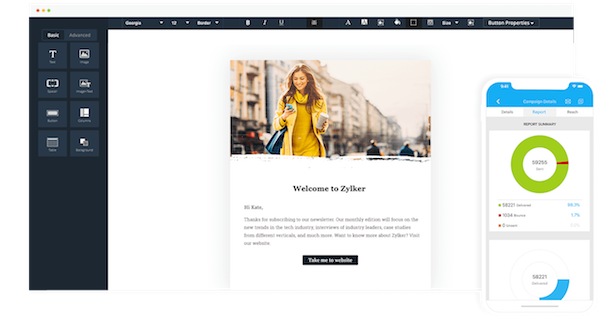 |
|---|
| Customer onboard email composer in Zoho Campaigns |
Price based customer segmentation
Some customers will be more price sensitive than others. Highly price-sensitive customers might hesitate to becoming a buyer. To help them make their first purchase you need to give them a discount offer. You can setup CRM to automatically send this offer to customers who hesitate before their first purchase.
Convert abandoned carts
Many customers will abandon their shopping carts on your website. You can nudge these customers to complete the purchase by sending a timely reminder. CRM can completely automate this process.
Product discovery
Some customers might get lost on your website. This could be because of a bad design/interface or just the size of your website. You can send a message to these customers about products/services they were trying to find. CRM can automate this process. It can guess the customer’s need from data about the customer.
Demand anticipation
CRM can help you forecast the needs of customers. For example, if a customer bought a pack of diapers from your website, CRM can estimate when the customer needs to buy again. It can send an automatic message to the customer reminding him to buy diapers before it runs out. This will delight your customers.
Prevent customer churn
Sometimes customers stop buying from you because they forget the value you provide. For example, if you are an online grocery store, the value you provide is convenience. But some customers might forget this convenience once they start doing their grocery shopping when they commute. In such cases, you need to remind these customers of the convenience of buying online. CRM can do this by sending a message with an offer automatically to such customers. The offer will entice customers to buy remember the value you provide.
Live chat/chatbots
Many customers will require interaction with a sales representative to help in buying even though they are buying on a website. CRM can help here by automating parts of this interaction. For example, CRM can automatically initiate a conversation with every website visitor. Once a customer starts a conversation it can be routed to a human sales representative. In the future CRM will be able to have a full fledged conversation with a customer with chatbots. This will be possible due to advances in AI and machine learning.
 |
|---|
| Live chat |
CRM vendors for B2C marketing
Large companies
If you are a large company you should opt for one of the four big CRM vendors - SAP, Oracle, Salesforce and Adobe. These vendors have considerable experience in implementing CRM in large companies. They will customise their product according to your legal, security and product requirements.
SAP
SAP has a marketing CRM product called “SAP Marketing Cloud”. It has features useful for large companies like automatic customer profiling, marketing planning and multi-channel engagement.
Oracle
Oracle has several marketing CRM products in its “Oracle Marketing Cloud” suite. “Oracle Eloqua” is for planning customer journeys. “Oracle Responsys” is for multi-channel messaging. “ Oracle BlueKai” is for customer data management. “Oracle Maxymiser” is for testing and personalization. “Oracle Infinity” is for analytics.
Salesforce
Salesforce has a marketing CRM product called “Salesforce Marketing Cloud”. It has features useful for large companies like predictive recommendations, multi-channel messaging and social media monitoring.
Adobe
Adobe has a marketing CRM product called “Marketo”. “Marketo” was an independent company which was acquired by Adobe in 2018. “Marketo” has features useful for large companies like multi-channel engagement, personalised digital advertisements and AI-based personalised content.
Startups and SMBs
If you are a start-up or a small/medium sized business then you can use a CRM product off the shelf. Some of the popular products are given below.
Zoho
Zoho has a marketing CRM product called “Zoho Campaigns”. It is mainly for email based customer engagement.
Delivery method - Cloud Major features - Campaign editor, personalised email campaigns, third-party integrations Price - Depends on the volume of email. Starts at $32 for 500 emails.
Localytics
Localytics started as a product for mobile app analytics. It has since developed into a full fledged marketing CRM product.
Delivery method - Cloud Major features - App marketing, customer profiling, AI-based conversion optimisation. Price - Depends on monthly active users (MAUs).
Mixpanel
Mixpanel is an app analytics product which has developed into a marketing CRM product. Its strength is its integration with mobile apps.
Delivery method - Cloud Major features - Automatics insights, customer retention analytics, journey funnels Price - Starts from $150 per month
Intercom
Intercom is a marketing CRM product which helps in acquiring, engaging and retaining customers. Its strength is its unified messaging dashboard.
Delivery method - Cloud Major features - Customer on-boarding, A/B testing of campaigns, live chat Price - $49 to $75 per month
Noteworthy B2C marketing CRM vendors
Mailchimp
Mailchimp is a global leader in email marketing. It has some CRM features like landing pages, product recommendations and A/B testing. Prices range from $10 to $199 per month and upwards.
Optimizely
Optimizely is a global leader in customer experience marketing. Its main product is an A/B testing tool. It helps you run experiments on your website to improve customer engagement. Price depends on the features used.
Pushcrew
Pushcrew specializes in push notifications for web browsers. If will help you re-engage your website visitors. It costs from $18 to $53 per month.
Livechat
Livechat is a tool which will help you chat with visitors on your website. The product costs from $16 to $149 per month.
CRM in B2C customer support/service
Customer support is very important in the service industry. The quality of support can single-handedly make or break a relationship with a customer. For example, if a hotel doesn’t respond to guest queries in a timely manner, it will create a bad experience for the guest. The guest will eventually stop being a customer of the hotel. But it is not easy to provide good customer support. This is due to the variability of employees. This is where CRM can help. It can automate and personalise certain aspects of customer support to handle employee variability. CRM will reduce the skill requirement of your support team. CRM can help your support team in remembering customer context and behaviour.
Use-cases of CRM customer support
Ticketing system
A ticketing system is a basic CRM implementation to improve customer support. It will make your support less dependent on individual support agents. A unified dashboard will be available for all your support agents which show all customer queries. If an agent doesn’t respond to a query on time, the software can automatically ask another agent to look into it.
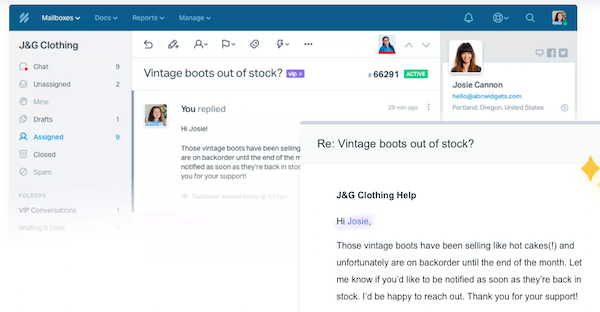 |
|---|
| Ticketing system in Helpscout |
Single view of a customer
CRM can store all information about your customers in a database. Then, it can use this information available to support agents though an easy to use dashboard. When a query comes from a customer, your support team will have a complete context in front of them. It will help them answer the query in the most personalised manner.
Handling of public customer complaints
Many customers will complain about your company in public forums like social media. It will be difficult to monitor such complaints manually. CRM can help by constantly monitoring public forums for complaints. It can automatically contact customers to offer a resolution. Once the customer responds to the message, a support agent can take over and resolve the complaint.
Helping support agents be friendly to customers
You can codify your company’s support process in CRM software. The process can include logical steps for the resolution of every support query. For example, if a customer is disappointed with the product you sold, the CRM can prompt the support agent to give a free coupon. Your support agents don’t have to think about the appropriate behaviour to resolve a query. The CRM will do that automatically according to the process you codify.
Customer self-service
The best way to resolve a customer query is by enabling a customer to resolve it on his own. This can be achieved having detailed FAQs (Frequently asked questions)/Knowledge base on a website or app. You can direct customers do search on this website/app to find answers to their queries. CRM can help in generating this knowledge-based by finding patterns in customer queries. It can also help customers search the database by remembering the context of a customer. For example, if a customer has a pending order, the CRM can automatically display FAQs on pending orders when the customer visits the knowledge base.
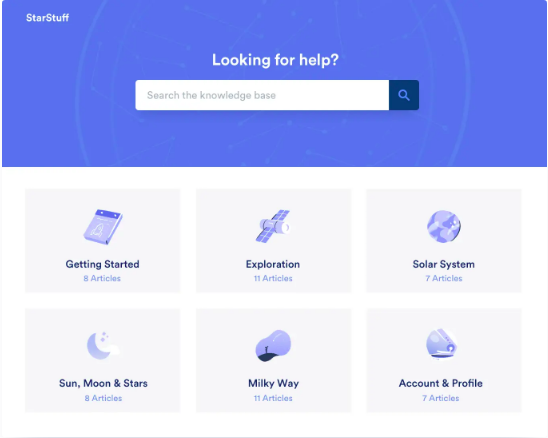 |
|---|
| Knowledge base in Helpscout |
Automation of support
Advances in the field of AI and machine learning will be able to completely automate customer support in the future. It is already automating certain aspects of support using mechanisms like automatic replies and canned responses.
Automatic replies
CRM can automatically reply to support queries using AI and machine learning. It can learn automatic replies by monitoring manual replies of support agents. For example, your company could suddenly get numerous support queries due to a product defect. Initially, your support agents will be manually replying to each query. CRM can quickly see a pattern in these replies and create a standard response. It can then start replying automatically to new queries.
Canned responses
CRM can automatically respond to common support queries. For example, if a customer seeks the status of an order, CRM can automatically look up the status in the order management system and reply to the customer with the status.
CRM vendors for customer support
Large companies
If you are a large company you should opt for one of the five big CRM vendors for customer service software - SAP, Oracle, Salesforce, Microsoft and Zendesk. These vendors will have a deep understanding of customer service requirements of large companies. They will be able to customise their products according to your company’s legal and security requirements.
SAP
SAP has a customer service product called “SAP Service Cloud”. It has features useful for large companies like unified service dashboard, conversational AI and knowledge base. They also provide training and certification for support agents.
Oracle
Oracle has a customer service product called “Oracle Service Cloud”. It has features useful for large companies like a virtual assistant, intelligent knowledge base and self-service portal.
Salesforce
Salesforce has a customer service product called “Salesforce Service Cloud”.It has features useful for large companies like omnichannel routing, service automation and service analytics.
Microsoft
Service desk software is one of the products in Microsoft’s “Dynamics 365” enterprise software suite. It has features useful for large companies like multi-channel service, AI-driven insights and third-party integrations
Zendesk
Zendesk is the global leader in customer service software. It has features useful for large companies like answer bot, business rules and intelligent routing.
Startups and SMBs
If you are a start or a small/medium sized business then you can use a CRM product off the shelf. Some of the popular products are given below.
Zoho
Zoho has a customer service product called “Zoho Desk”. It has thousands of SMB clients from across the world.
Delivery method - Cloud Major features - Agent productivity management, AI-driven replies, multi-channel messaging Price - $12 to $25 per agent per month.
Freshdesk
Freshdesk is a fast growing customer service software startup.
Delivery method - Cloud Major features - SLA management, canned responses, time based automation Price - $19 to $89 per agent per month.
Hubspot
Hubspot has a customer service software “Hubspot Service Hub”. It is mainly targeted at internet based companies.
Delivery method - Cloud Major features - teach dashboard, self-service, live chat Price - $50 to $1200 per month.
Help Scout
Help Scout is a company exclusively specialising in customer support software. It is an ideal product for startups.
Delivery method - Cloud Major features - knowledge base, collision detection, AI-driven live chat Price - $20 to $32 per month.
Groove
Groove sets itself apart from other products by making support conversations look like one-on-one conversations in an email inbox.
Delivery method - Cloud Major features - shared inbox, knowledge base, third-party integrations Price - $12 to $32 per month.
Noteworthy customer service CRM vendors
Buffer
Buffer is the global leader in social media monitoring and messaging. It will help you monitor customer complaints on social media. It costs from $15 to $399 per month.
Mojo Helpdesk
Mojo Helpdesk is a full-fledged customer service software for Gmail. If your company uses Google Suite then Mojo helpdesk will cost-effective customer service solution for you. It costs from $29 to $399 per month.
Pitfalls in implementing CRM
Lack of employee adoption
The biggest pitfall in implementing CRM in any organisation is lack of employee adoption. This leads to money wasted in expensive CRM implementation which is never used. The reason for the lack of internal adoption is company culture. If your company doesn’t have a customer friendly culture, CRM will not change it. The software cannot change the mindset of people. If your company already has a customer friendly culture then CRM will be naturally adopted by your employees. They will immediately see its benefits. They will thank you (the management) for implementing it.
Ideas for changing company culture is beyond the scope of this article. But you can achieve small successes with CRM even if your company doesn’t have the right culture. You can use CRM tools which use artificial intelligence (AI) and customer self-service to achieve this.
AI-based CRM will improve your interactions with leads and customers at scale, without the involvement of employees. For example, in B2B sales you can use AI to automatically read emails from leads and respond to them accordingly in specific scenarios. For example, if a lead says he is not interested in buying at the moment, the AI can automatically send a cordial reply and automatically prompt the sales team to contact him again at a future time. In B2C marketing, you can use AI to learn about the taste of customers and use it to meet their needs. For example, if you are a retailer, AI can profile your customers based on what they buy and send them relevant offers. For example, it can send baby product offers to a customer who regularly buys diapers. AI can also help in B2C customer support. You can deploy a conversation chat service (chatbot) to interact with customers. It can use machine learning (ML) to learn from previous interactions with customers and answer automatically to customer queries.
Self-service based CRM will enable your leads and customers to help themselves. For example, in B2B sales, if a lead is asking for a meeting in an email, CRM can automatically share a calendar of a sales representative and provide slots for the lead to book. This way the lead can book a meeting slot on his own. This will save time wasted in an email exchange to fix a slot. In B2C marketing, you can use self-service in the form of subscriptions. For example, if you are a retailer selling diapers, you can offer a monthly diaper subscription on your website. It is a win-win scenario for the customer and you. It’s less hassle for your customers and it’s marketing money saved for your store. You also don’t need to depend on employees for marketing. In B2C customer support, you can use self-service in the form of FAQs/knowledge base. The knowledge base will help customers find answers to their queries on their own. It is again a win-win for the customer and you, the company. The customer saves time and you don’t have to depend on your employees to provide quick support.
 Blog
Blog